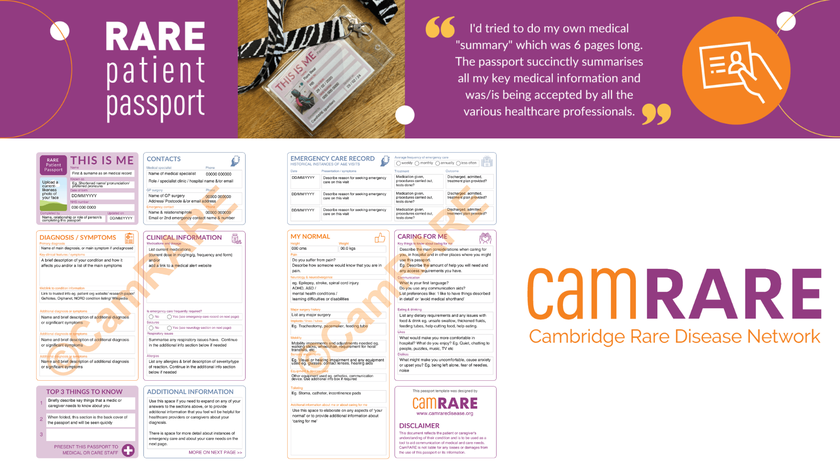A paper published in the European Journal of Human Genetics supports the roll-out of the Rare Disease Patient Passport, developed by Cambridge Rare Disease Network.
'Patient passports’ support communication and healthcare coordination by sharing healthcare information with Healthcare Professionals (HCPs), which has been shown to reduce the burden on patients and caregivers. Despite this, currently no widely adopted passport addresses the multifaceted needs of patients with rare diseases.
Individuals with rare conditions often face unique and complex healthcare challenges. These conditions can be difficult to diagnose and treat due to their rarity and the limited understanding within the medical community. Explaining a rare condition to a new healthcare professional or in a stressful emergency can be daunting. To ensure the best possible care, it’s important to communicate clearly and effectively.
Cambridge Rare Disease Network's (CamRARE’s) community of families from across the East of England, known as Unique Feet, shared their worries during the early stages of the COVID-19 pandemic. Concerns expressed by families included 'What would happen if they couldn’t stay with their child in hospital' and 'What would happen if their child was seen by clinicians outside of their normal care team?' This project unveiled a long-standing struggle faced by these families: a constant battle to share vital medical and care information with a wide range of professionals.
In response, CamRARE developed the ‘This is Me’ Rare Patient Passport in collaboration with Unique Feet families and medical professionals. Designed to address the unique needs of individuals with rare conditions, the passport aims to provide comprehensive but succinct personalised information about a patient in a way that standard health passports do not.
New study supports use of rare disease patient passports
A new paper, published in the European Journal of Human Genetics (opens in a new tab), presents a service evaluation of the 'This is Me' patient passport. As part of the evaluation, patients and caregivers completed surveys before and after using the passport. HCPs were also surveyed on their perception of the passport.
Responses from patients and carers
Of 157 ‘pre-passport’ survey respondents, 96% spent considerable time explaining medical needs to new care teams, whilst 65% found communicating care needs challenging. Nearly all respondents (99%) believed a document presenting relevant healthcare information would be helpful.
Among 55 ‘post-passport’ survey respondents, 85% used the passport during care interactions; 72% found it eased communication with unfamiliar teams, and 64% felt more confident communicating their needs.
Over half (54%) felt the passport helped access needed care, 68% found it more useful than existing tools, and 76% were highly likely to recommend it to peers.
Responses from healthcare staff
All 31 HCP respondents listed perceived benefits, including improved HCP-patient/caregiver communication. By alleviating patient/caregiver-HCP communication challenges, this rare-disease-specific patient passport can enhance healthcare coordination and patient experiences.
Find out more
The CamRARE ‘This is Me’ Rare Patient Passport is a printable PDF. Supplied with guidance notes, it’s easy to complete and keep updated. It can be used as an A4 page, or folded to fit in a lanyard wallet.


